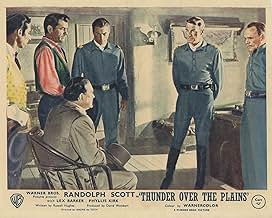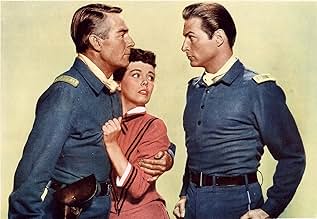Aggiungi una trama nella tua linguaIn Post-Bellum Texas, an army captain tries to keep the peace between overtaxed, impoverished farmers and greedy carpetbaggers.In Post-Bellum Texas, an army captain tries to keep the peace between overtaxed, impoverished farmers and greedy carpetbaggers.In Post-Bellum Texas, an army captain tries to keep the peace between overtaxed, impoverished farmers and greedy carpetbaggers.
- Regia
- Sceneggiatura
- Star
- Hodges' Sergeant
- (non citato nei titoli originali)
- Texan
- (non citato nei titoli originali)
- Walter Morgan
- (non citato nei titoli originali)
- Trooper
- (non citato nei titoli originali)
- Texan
- (non citato nei titoli originali)
- Kehoe
- (non citato nei titoli originali)
Recensioni in evidenza
Randolph Scott is a Union army captain, but also a Texan and he sees both sides. Henry Hull is his put upon commanding officer and Charles McGraw plays a leader of a local gang who have risen up like Robin Hood among the oppressed. These guys aren't Ku Klux Klan nightriders by any means though.
Our villains are Hugh Sanders and Elisha Cook, Jr. a pair of scurvy lowlifes if there ever were. They've got quite the little self perpetuating racket. The more they extort, the more McGraw raids, the more Sanders and Cook cry that the army has to stay in Texas. Just about anything is blamed on McGraw and his men.
There's also a domestic crisis of sorts with newly arrived captain Lex Barker, an arrogant sort who was on duty in Washington and would like to get back there. Barker's bored and he makes a play for Phyllis Kirk who is married to Randolph Scott. Since they don't like each other from the beginning that only increases the problem.
Andre DeToth who did several westerns including a few with Randolph Scott brought home a good one here. With themes like an attempt at adultery here, this was not a western for the Saturday matinée kiddie trade. DeToth's best in my opinion is one called Ramrod with Joel McCrea and his then wife Veronica Lake, but this one is pretty good too.
DeToth also learned from the best and the final shootout scene with Scott against four men bears no small resemblance to High Noon, released a year earlier.
Definitely one of Randolph Scott's best westerns of the Fifties.
Tale set in post Civil War Texas where carpetbaggers ruled almost supreme, and the occupying Federal troops seemed to let them. There's a gang of patriotic outlaws led by a Robin Hood character trying to redress the balance and a complicated set of sympathies and antagonisms with which to contend. And Lex Barker was playing a nutter. But if I correctly remember my extensive Frank Yerby reading when I was a kid surely in reality the Ku Klux Klan couldn't have been far away in matters of this kind in their role of Southern saviours? There's time in this shortish formula fiction film for lots of plot twists, cold business, love, jealousy, rage, backstabbings, murders galore, some honour and integrity, all of it delivered with plenty of panache, a nice colour and sporadically excellent camera-work.
It's enjoyable hokum up to a point but ultimately loses its way because there's no one you can really root for but many you can root against. Naturally, Scott is as dependable as usual.
Frankly good main and support cast in an acceptable Western professionally directed by Andre De Toth
This is a tornado and adventure movie from Warner Bros , containing thrills , emotion , suspense , go riding and crossfire . A decent cavalry western with a twisted and complex intrigue written by Russell Hughes . As our captain Randolph Scott has to confront a nasty powerful owner : Hugh Sanders , while must avoid a new and envious officer : Lex Barker who attempts to take his wife Phyllis Kirk . As the trío of decent protagonists : Randolph Scott , Phyllis Kirk and Lex Barker give acceptable interpretations . They are well accompanied by a pretty support cast with plenty of familiar faces , such as : Henry Hull , Charles McGraw , Elisa Cook Jr , Lane Chandler , uncredited Trevor Bardette, James Brown of Rin Tin Tin TV series and Fess Parker of Daniel Boone TV series.
The motion picture was well directed by Andre De Toth , though it has some flaws and gaps . De Toth was a good artisan of long career , writing , producing and directing several movies . As he made all kinds of genres , outstanding in Western , such as : Ramrod , Carson City , The Indian Fighter , Day of Outlaw , Thunder over Plains . And he made other genres including films as The other love , Pitfall , None Shall escape , Crime Wave , Dark Waters , Monkey on my Back , Play Dirty . Being his biggest hit , the boxoffice terror House of Wax . Rating : 6/10 . Passable and acceptable Western that will appeal to Randolph Scott fans . Worthwhile seeing .
The rivalry between the two captains, Scott and Barker, is an interesting feature, especially when it extends to Scott's wife (Kirk). That scene where the home-sick wife is captivated by the handsome Barker is both well played and unusual for a western. Note too how Scott is compelled by the byplay to fade into the background, another unusual feature for a western hero.
Though filmed just west of LA, the rolling scenery makes a good Technicolor backdrop to the action. Much credit for making the elements work should go to director de Toth who was skilled at handling conflict as shown in his masterwork, Ramrod (1947). The redoubtable Sam Peckinpah also selected de Toth to direct many episodes of his groundbreaking TV series The Westerner (1960).
On the whole, it's a complicated story of personal and political conflict but still delivers the goods for fans of westerns.
First, there's an intelligent script by Russell Hughes, who wrote for some good radio shows like "Nightbeat" and Alan Ladd's "Box 13", as well as such films as Anthony Mann's "Last Frontier", Delmer Daves' "Jubal", and even the best of the giant-bug movies, "Them".
Then, there's the look and feel of the film. Director Andre De Toth and his great cinematographer Bert Glennon (who had done remarkable work with the likes of Josef von Sternberg and John Ford) light and shoot for realism and emotional impact. Glennon had also shot "Man Behind the Gun" (available on the flip side of this DVD), so I suppose director Felix Feist could be blamed for that film's phony-looking stage sets. Here, in "Thunder... ", a barroom scene looks like it was shot in a real barroom (foreshadowing Clint Eastwood's "natural lighting" technique by decades) and exteriors are shot outdoors. To be fair, the Feist film may have had budget or producer issues, but given that film's potential (dealing with water rights, corrupt politicians, the possible secession of southern California, even the semi-legendary Joaquin Murrietta as a supporting character) it still seems like a typical, entertaining, 40's-style B-movie. "Thunder...", released the same year, 1953, seems more forward-looking, more compelling, more of the age of the "adult" Westerns, even though the literally flag-waving ending with its narrative paean to the great state of Texas kind of pulls us back to B-movie-land.
Lo sapevi?
- BlooperGrowing cotton and transporting cotton bales thru the hilly countryside was a foolish director's scheme. In 1869 cotton wasn't grown within 1,000 miles of this area.
- Citazioni
Norah Porter: Whatever became of Frances Bilky?
Captain Bill Hodges: I don't know. She married a colonel, I think. Maybe it was a general. At any rate, she outranks all of us.
Norah Porter: But that's wonderful! Now she'll have her lifelong ambition to lead the cotillion. Well, I guess that's what I always wanted too.
Captain Bill Hodges: You don't have anything like that around here, do you, Captain?
Captain David Porter: Oh, I don't know. The Indians come down once a month and dance for us.
- ConnessioniReferenced in Radiografia di un colpo d'oro (1968)
I più visti
- How long is Thunder Over the Plains?Powered by Alexa
Dettagli
- Tempo di esecuzione
- 1h 22min(82 min)
- Proporzioni
- 1.37 : 1



















